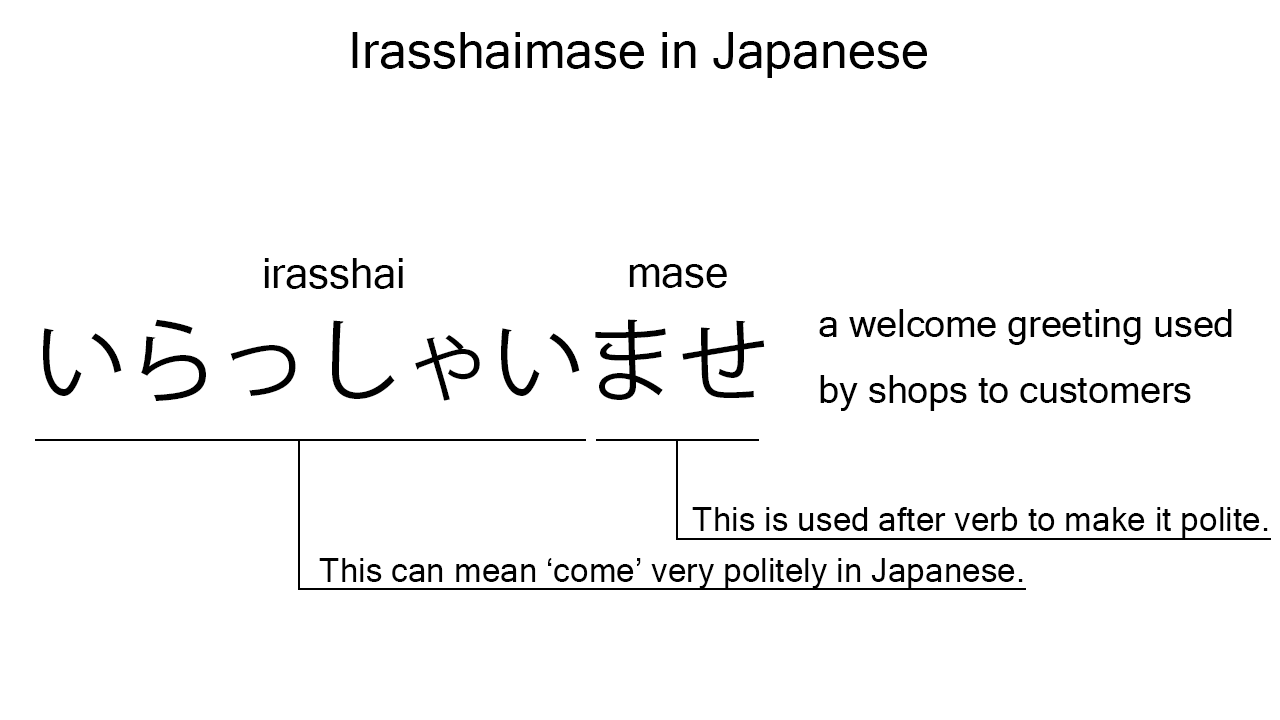What does “irasshaimase” mean in Japanese?
“Irasshaimase” cannot be perfectly translated into English, but somehow this phrase is often translated as “welcome”. Perhaps, some Japanese learners know this phrase as it is often used in Japanese movies, novels, manga, anime, and the like. In this blog post, however, I will explain this phrase in detail based on its grammatical components. And also, I will explain how to use it through an example sentence. My explanations would help Japanese learners understand “irasshaimase” more clearly. Then, let’s get started!
Contents
- Definition and meanings of “irasshaimase”
- What does “irasshaimase” literally mean in Japanese?
- Summary
Definition and meanings of “irasshaimase”
Let me start with the definition and meanings of “irasshaimase”.
- irasshaimase – いらっしゃいませ : a Japanese phrase often translated into English as “welcome”, “welcome to our shop”, “can I help you?”, or such.
This is a kind of Japanese welcome greeting which shops and restaurants use when somebody comes in. So, its usage is similar to those of the English phrases like “can I help you?”, “may I help you?”, and even just “hello”. Its literal meaning is very close to that of “come in”, but this does not reflect well the Japanese politeness. It is therefore really hard to translate this phrase into English. Still, its grammatical components help us understand what it really means. Let me explain them, one by one.
What does “irasshaimase” literally mean in Japanese?
“Irasshaimase” consists of the following two components:
- irasshai – いらっしゃい : the command form of the verb, “irassharu”, which very politely means ‘to come’, ‘to go’, or ‘to be’ in Japanese.
- mase – ませ : the command form of the auxiliary verb, “masu”, which is used after a verb to make it polite.
These two components tell us that “irasshaimase” is literally a very polite imperative expression for ‘come’. “Very polite imperative” probably sounds a bit weird, but this is the Japanese way of greeting to customers to shops. I think now you can understand why “irasshaimase” is literally close to “come in” and how it is functionally different from “welcome”. This Japanese phrase is not suitable for the moment when somebody has just arrived somewhere.

When we meet new Japanese phrases, we should check their grammatical components in detail to understand their meanings clearly and deeply. In many cases, components tell us a lot about the meanings of the phrases they form. Actually, here, we could get the better understanding of “irasshaimase” through the detailed check above.
So far, I’ve explained the definition and meanings of “irasshaimase” together with its grammatical components. Then, let me explain how to use it through the example sentence below.
Example: how to use “irasshaimase”
boku wa okyakusan ni 「irasshaimase」 to it ta – 僕はお客さんに「いらっしゃいませ」と言った (ぼくはおきゃくさんに「いらっしゃいませ」といった)
I said to the customer, “hello, how can I help you?”
Below are the new words used in the example sentence.
- boku – 僕 (ぼく) : a pronoun meaning ‘I’ in Japanese. This is used mainly by boys and young males.
- wa – は : a binding particle working as a case marker or topic marker. In the example, this works after “boku” to make the subject in the sentence.
- okyakusan – お客さん (おきゃくさん) : a noun meaning ‘customer’ in Japanese. This can also work as plural. Learn more about Japanese plural.
- ni – に : a case particle used to say in which direction an action goes. In the example, this is used after “okyakusan” to indicate to whom the speaker said “irasshaimase”.
- to – と : a case particle working as a quote marker. In the example, this works after the clause to indicate what the speaker said.
- it – 言っ (いっ) : one conjugation of the verb, “iu“, which means ‘to say’ or such in Japanese. In the example, it has been conjugated for the better connection with its following word.
- ta – た : an auxiliary verb used after a verb, adjective, or auxiliary verb to make its past tense form. Probably, this is well known as a part of Japanese ta form. In the example, this is used after “it” to make its past tense form, “it ta”.
This is a typical usage of “irasshaimase”. Its meaning can vary depending on the context and situation. In this example, it has been translated as “hello, how can I help you?” When we want to use a welcome greeting to customers to shops in Japanese, anyway, this phrase is the best option.
Summary
In this blog post, I’ve explained the definition and meanings of “irasshaimase” in detail based on its grammatical components. And also, I’ve explained how to use it through the example sentence. Let me summarize them as follows.
- irasshaimase – いらっしゃいませ : a Japanese phrase which shops and restaurants use when somebody comes in. So, its usage is similar to those of the English phrases like “can I help you?”, “may I help you?”, and even just “hello”. Its literal meaning is very close to that of “come in”, but this does not reflect well the Japanese politeness. It is therefore really hard to translate this phrase into English. From the grammatical point of view, this is a very polite imperative expression for ‘come’. “Very polite imperative” probably sounds a bit weird, but this is the Japanese way of greeting to customers to shops.
Hope my explanations are understandable and helpful for Japanese learners.